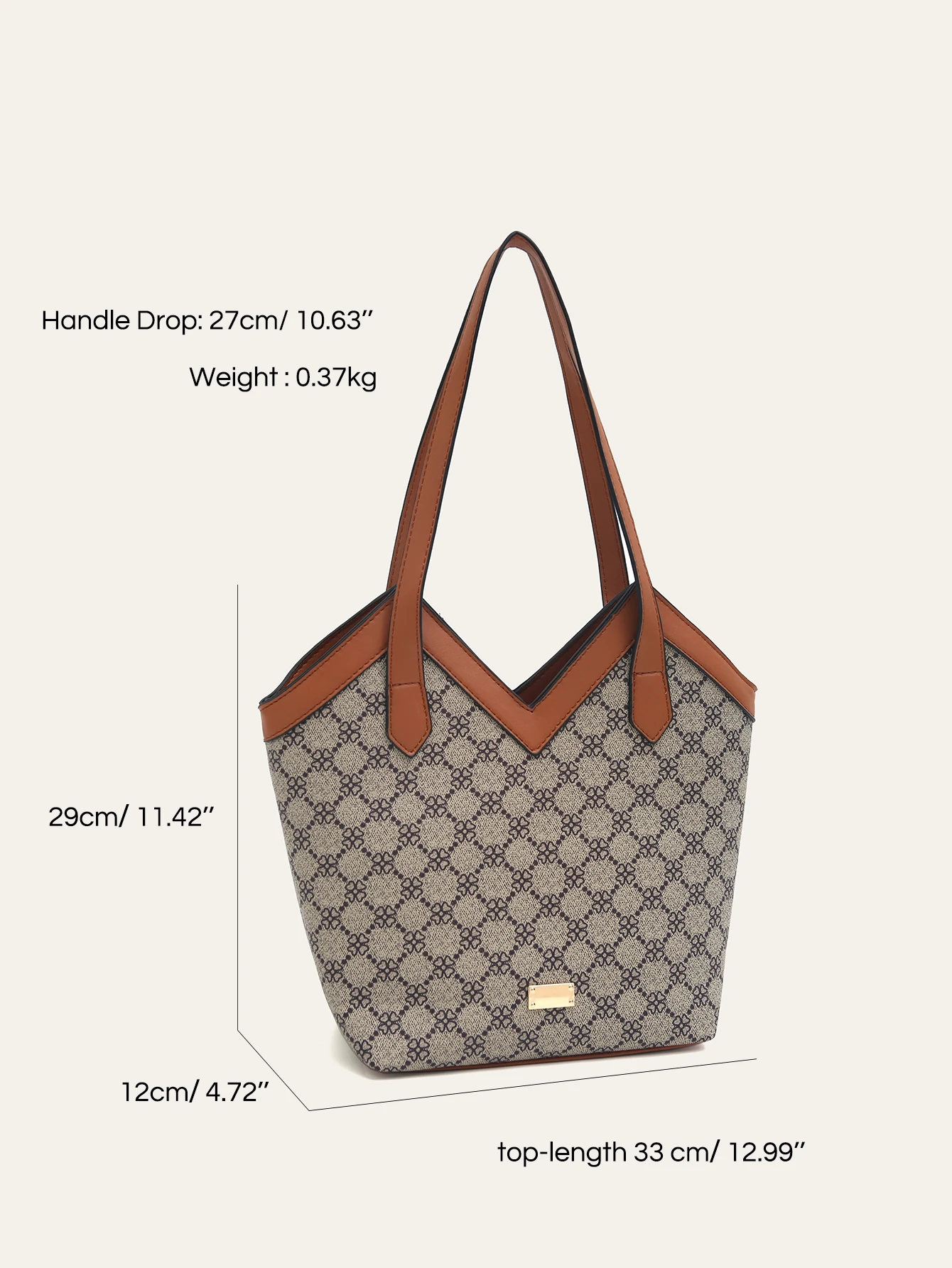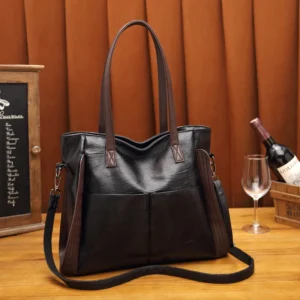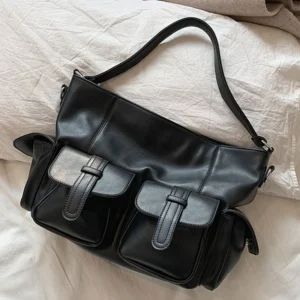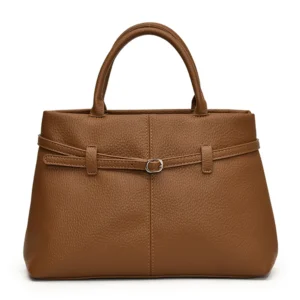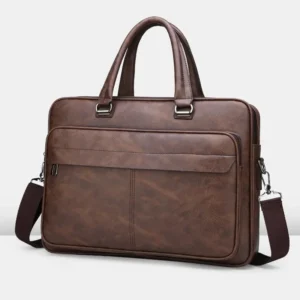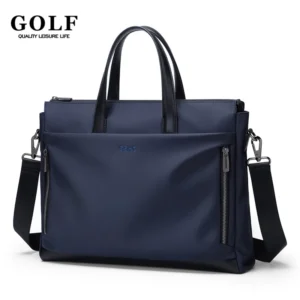Understanding Vegan Leather: What It Is and Why It Matters
Vegan leather represents a revolutionary approach to fashion and accessories—materials crafted to mimic the look, feel, and function of traditional leather without using any animal products. These alternatives have surged in popularity as consumers increasingly seek products that align with their values while maintaining style and functionality.
The market for vegan leather has grown substantially, with reports showing a projected compound annual growth rate of over 7% in the coming years. This rise reflects a fundamental shift in consumer consciousness, with more people questioning the origins of their purchases and seeking ethical alternatives.
From handbags to shoes, belts to furniture, and importantly, professional accessories like briefcases and portfolios, vegan leather serves as a direct substitute for animal-derived materials. Understanding the key differences between traditional and vegan leather options helps consumers make choices that better align with their personal and professional values.
What makes vegan leather particularly appealing is its versatility. No longer relegated to cheap, plastic-looking substitutes, today’s vegan leather spans countless textures, colors, and applications. Major fashion houses and accessory brands have embraced these materials, recognizing both consumer demand and the opportunity for innovation.
Types of Vegan Leather: Exploring Your Options
The term “vegan leather” encompasses a diverse range of materials, each with distinct properties, production methods, and environmental impacts. Understanding these differences is crucial for making informed choices that align with your values and needs.
Synthetic Vegan Leathers
PU (Polyurethane) Leather
PU leather consists of a fabric base coated with polyurethane, offering a more flexible and breathable alternative to other synthetics. It’s widely used in fashion accessories, furniture, and automotive interiors due to its durability and ability to closely mimic genuine leather. PU leather generally has a lower environmental impact than other synthetics, though it’s still petroleum-derived.
PVC (Polyvinyl Chloride) Leather
Often called “pleather” or vinyl, PVC leather is made by applying a plastic coating to a fabric backing. While highly durable and water-resistant, PVC raises significant environmental concerns due to the toxic chemicals used in production and its non-biodegradable nature. It’s typically found in lower-priced accessories and upholstery.
Plant-Based and Innovative Options
The most exciting developments in vegan leather come from natural, plant-based sources that offer improved sustainability while maintaining quality:
Pineapple Leather (Piñatex)
Created from pineapple leaf fibers—a byproduct of the pineapple harvest—Piñatex requires no additional land, water, or fertilizers beyond what’s already used for fruit production. The resulting material offers a distinctive texture that’s both durable and flexible, appearing in luxury accessories and footwear.
Mushroom Leather (Mylo, Reishi)
Derived from mycelium (the root structure of mushrooms), this innovative material grows quickly with minimal resources. Companies like Bolt Threads (Mylo) and MycoWorks (Reishi) have developed mushroom leathers praised for their remarkable similarity to animal leather in both appearance and performance.
Cactus Leather (Desserto)
Developed in Mexico, cactus leather utilizes the mature leaves of nopal cactus plants. This material stands out for its minimal water requirements and the ability to produce a remarkably soft, supple texture suitable for premium accessories and apparel.
Other promising options include apple leather (made from apple industry waste), cork leather (harvested sustainably from cork oak trees), and materials derived from grape waste, corn, and even recycled materials.
For those interested in deeper exploration of specific vegan leather materials and their properties, each option presents different benefits and considerations depending on your priorities.
Ethical Advantages: The Cruelty-Free Commitment
For many consumers, the primary motivation for choosing vegan leather is ethical concern for animal welfare. Traditional leather production requires the use of animal hides, with over one billion animals killed annually for their skins. By choosing vegan alternatives, consumers directly reduce demand for these products.
The standard leather production process often raises significant ethical questions. Beyond the slaughter itself, concerns include questionable farming conditions, transportation stress, and methods of hide removal. Vegan leather offers a clear alternative that eliminates these ethical dilemmas entirely.
This cruelty-free commitment extends beyond the product itself to align with broader ethical consumer movements. For those already making conscious choices in other aspects of their lives—from diet to household products—vegan leather allows for consistency in their ethical stance. It represents a holistic approach to compassionate living rather than an isolated purchasing decision.
The growing availability of different ethical alternatives to traditional leather has made it easier than ever to find options that don’t compromise on quality or style. Many vegan leather products now carry certifications like “PETA-Approved Vegan,” providing additional assurance to conscientious consumers about their purchasing choices.
For professionals seeking to align their work accessories with their personal values, vegan leather offers the perfect solution—maintaining a polished, sophisticated appearance without conflicting with ethical principles.
Environmental Impact: A Complex Picture
The environmental equation of vegan leather isn’t straightforward. Rather than viewing it as universally better or worse than traditional leather, it’s important to understand the nuances of different materials and production methods.
Traditional leather production carries significant environmental burdens, including:
– Deforestation for cattle ranching (leather is often a co-product of the meat industry)
– Intensive water usage (up to 17,000 gallons of water per ton of hide)
– Pollution from tanning processes that use chromium and other hazardous chemicals
– Methane emissions from livestock
Plant-based vegan leathers offer several environmental advantages:
– Many utilize agricultural waste (like grape skins or pineapple leaves), creating value from materials that would otherwise be discarded
– Substantially lower water consumption (cactus leather uses about 1/20th the water of conventional leather)
– Reduced chemical usage, particularly with natural tanning processes
– Many are biodegradable at the end of their lifecycle
However, synthetic vegan leathers present environmental challenges:
– Production relies on fossil fuels as raw materials
– Most are not biodegradable and can persist in landfills for centuries
– Manufacturing often involves chemical processes with their own environmental impacts
– Some may shed microplastics throughout their lifespan
For those prioritizing environmental considerations, exploring sustainable alternatives in professional accessories reveals that plant-based vegan leathers generally offer the best ecological profile, though innovations in bio-based synthetics are continuously improving options across the board.
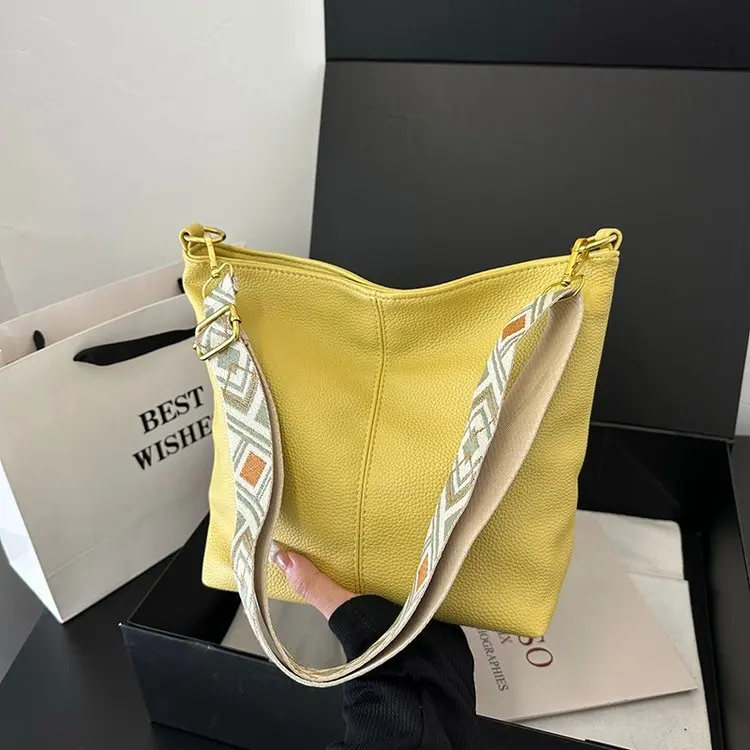
Practical Benefits: Durability, Maintenance, and Cost
Beyond ethical and environmental considerations, vegan leather offers several practical advantages that make it appealing for everyday use, particularly in professional settings.
Durability Features
- Many high-quality vegan leathers offer excellent resistance to scratching and scuffing
- Superior water resistance compared to traditional leather, which can stain or warp when wet
- UV resistance, with less susceptibility to fading and cracking from sun exposure
- Less vulnerability to mold and mildew
That said, durability varies significantly between materials. Premium plant-based options and high-quality synthetics can rival traditional leather, while lower-quality versions may deteriorate more quickly. For professionals seeking lasting accessories, in-depth analysis of durability in non-animal leather alternatives can help identify the best options.
Maintenance Advantages
- Simpler cleaning protocols—most vegan leathers can be wiped clean with mild soap and water
- No need for specialized conditioners or treatments
- Less absorption of liquids means easier stain removal
- No risk of drying out or cracking without regular conditioning
Cost-Effectiveness
- Generally lower production costs translate to more accessible price points
- Premium vegan leather options typically cost less than comparable genuine leather
- Less expense over time for cleaning and maintenance products
- Longer useful life when exposed to moisture or variable conditions
Additional Practical Benefits
- Lighter weight than traditional leather, an advantage for bags and travel items
- Greater flexibility out of the box, with no break-in period required
- Consistent texture and appearance across the entire product
These practical considerations make vegan leather particularly suitable for busy professionals who need reliable, low-maintenance accessories that maintain their appearance with minimal care.
Style and Versatility: Design Possibilities with Vegan Leather
Vegan leather’s aesthetic versatility might be one of its most compelling yet underappreciated advantages. Free from the natural constraints of animal hides, vegan materials open up remarkable creative possibilities for designers and brands.
Unlike traditional leather, which is limited by natural colorations and requires extensive processing for vibrant colors, vegan leather can be produced in virtually any color imaginable—from subtle neutrals to bold statement hues. This color versatility allows for greater personalization and expression through professional accessories.
Texture options are equally diverse. Vegan leather can mimic the exact grain patterns of various animal leathers—from the pebbled texture of traditional cowhide to the smooth finish of calfskin or the distinctive patterns of exotic leathers—all without ethical concerns. Beyond imitation, designers can create entirely new textures impossible to achieve with animal products.
The manufacturing flexibility of vegan leather also allows for innovative structural designs. Because many vegan leathers offer greater pliability and consistent thickness, they can accommodate intricate detailing, precise folds, and complex construction techniques that might be difficult with traditional leather.
For professional environments, exploring design versatility in professional vegan leather options reveals how these materials excel at both classical business aesthetics and contemporary professional styles. From structured briefcases to versatile totes, vegan leather adapts beautifully to workplace necessities while offering distinctive style.
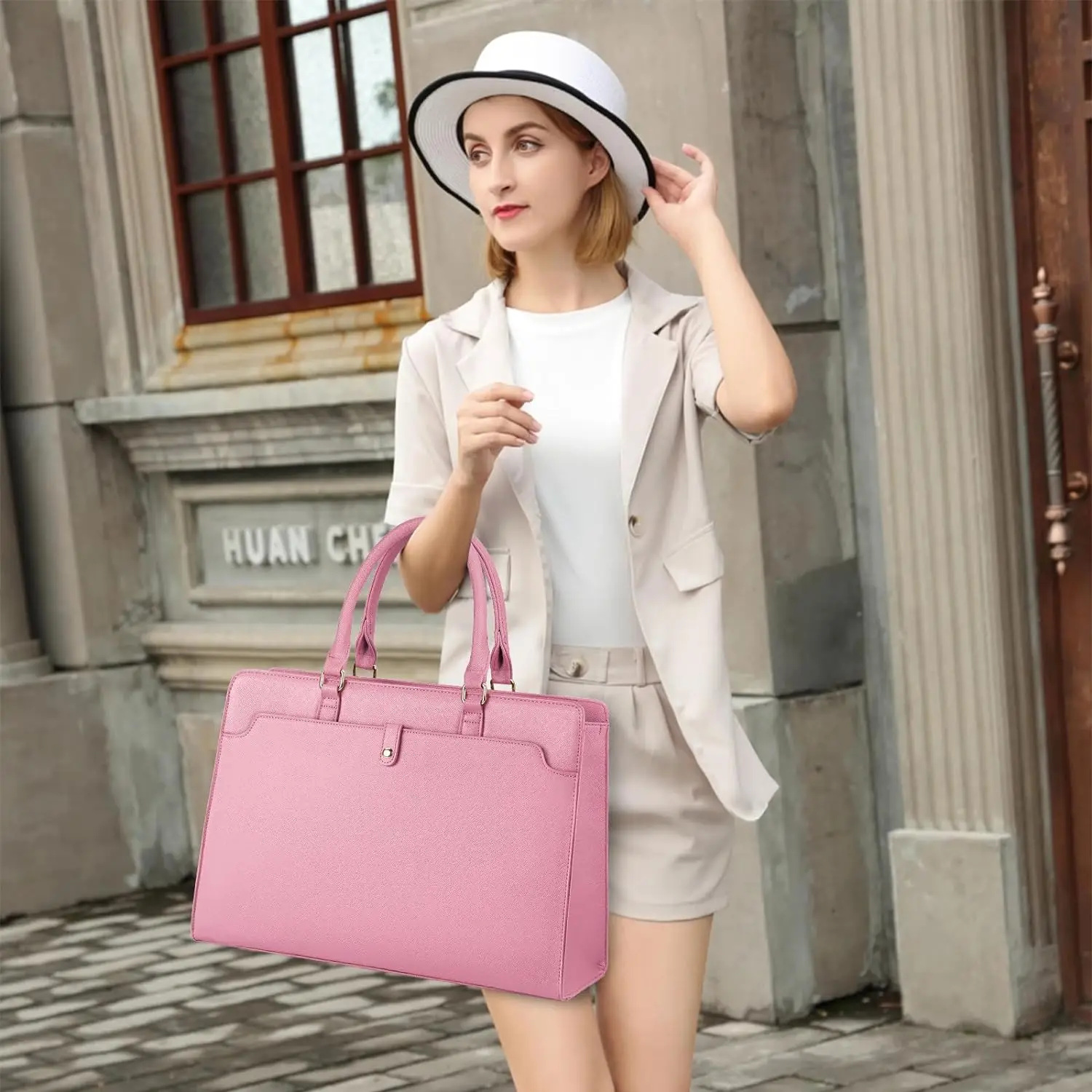
Quality Considerations: How to Choose the Best Vegan Leather
Not all vegan leather products offer the same quality and performance. Knowing what to look for ensures you invest in pieces that deliver on both ethics and excellence.
When evaluating vegan leather items, start with a thorough visual and tactile assessment. High-quality vegan leather should have:
– Consistent texture throughout the entire piece
– Even coloration without fading or blotchiness
– Precise, tight stitching with no loose threads
– Smooth edges with proper finishing
– A substantial feel that doesn’t seem flimsy or overly plastic-like
Brand transparency is another crucial indicator of quality. Reputable companies willingly disclose:
– Specific materials used (beyond just “vegan leather”)
– Manufacturing processes and standards
– Environmental certifications when applicable
– Care recommendations based on the actual material
When shopping online, scrutinize product descriptions carefully. Quality indicators include detailed material specifications, explanation of manufacturing techniques, and clear care instructions. Vague descriptions that only mention “vegan” or “animal-friendly” without material details may signal lower quality.
Price can be indicative of quality, but the relationship isn’t always straightforward. While extremely low prices often reflect poor materials and construction, mid-range vegan leather products can sometimes outperform high-end options depending on the specific materials used.
Understanding quality considerations when selecting professional accessories applies to vegan options as well. Look for reinforced stress points, quality hardware, and thoughtful interior organization—all signs of attention to detail that typically correlate with overall product quality.
Caring for Your Vegan Leather: Maximizing Longevity
Proper care significantly extends the life of vegan leather items, ensuring they remain beautiful and functional for years to come.
General Care Guidelines
- Clean regularly with a soft, damp cloth to remove dust and surface dirt
- Address spills immediately to prevent staining or material damage
- Avoid harsh chemicals, including alcohol-based products which can dry and crack synthetic materials
- Keep away from extreme heat sources which can warp or melt synthetic components
- Apply appropriate vegan leather protector sprays for additional resistance to moisture and stains
Cleaning Methods
- Prepare a mild solution of gentle soap and warm water
- Dampen (don’t soak) a soft cloth with the solution
- Wipe the surface using circular motions
- Follow with a clean, damp cloth to remove soap residue
- Allow to air dry completely away from direct heat or sunlight
Storage Recommendations
- Store in a cool, dry place away from direct sunlight
- Use dust bags when not in regular use
- Stuff bags with acid-free tissue to maintain shape
- Avoid hanging straps on sharp hooks that might cause deformation
- Keep away from items with dyes that could transfer to lighter-colored materials
Common Mistakes to Avoid
- Using leather conditioners designed for animal leather
- Applying oils which can damage synthetic materials
- Machine washing or soaking vegan leather items
- Exposing to prolonged direct sunlight which can cause fading and deterioration
Many of the maintenance principles that can be adapted for vegan alternatives focus on prevention rather than restoration. Regular, gentle cleaning and proper storage will prevent most common issues before they become permanent damage.
Black Leather Satchel, Brown Leather Satchel, Vegan Leather Work Tote
Price range: $69.58 through $73.23 Select options This product has multiple variants. The options may be chosen on the product pageBlack Leather Messenger Bag, Black Leather Work Tote, Faux Leather Work Tote
$101.88 Select options This product has multiple variants. The options may be chosen on the product pageBlack Leather Work Tote, Faux Leather Work Tote, Women's Leather Business Tote
Price range: $88.81 through $93.85 Select options This product has multiple variants. The options may be chosen on the product pageBlack Leather Satchel, Faux Leather Work Tote, Vegan Leather Work Tote
$120.38 Select options This product has multiple variants. The options may be chosen on the product pageMen's Slim Leather Briefcase, Slim Leather Laptop Briefcase, Vegan Leather Briefcase
Price range: $120.82 through $131.11 Select options This product has multiple variants. The options may be chosen on the product pageClassic Laptop Briefcase, Vegan Leather Briefcase
$244.29 Select options This product has multiple variants. The options may be chosen on the product page
Future Innovations: What’s Next for Vegan Leather
The vegan leather landscape continues to evolve rapidly, with research and development yielding increasingly sophisticated materials that further close the gap with traditional leather while enhancing sustainability.
Bio-fabrication represents one of the most promising frontiers. Companies like Modern Meadow are pioneering lab-grown collagen (the protein that gives leather its structure) without involving animals at all. This technology creates materials with the molecular structure of leather but produced through fermentation processes similar to brewing beer.
Other innovations focus on utilizing unexpected plant sources and waste streams. Researchers are developing vegan leathers from coffee grounds, kombucha culture, coconut water byproducts, and even algae—each offering unique properties and environmental benefits.
The luxury sector, traditionally hesitant to adopt alternatives, has begun embracing high-end vegan leathers. Major fashion houses have introduced vegan lines, bringing their design expertise and quality standards to these materials and elevating their market position.
Perhaps most encouraging is how consumer demand continues driving innovation. As more people seek vegan options without compromise, manufacturers respond with improved performance characteristics—addressing previous limitations in breathability, aging aesthetics, and durability.
At Poise Porter, we’re excited about these developments as they allow us to offer professional accessories that meet our exacting standards while embracing forward-thinking materials.
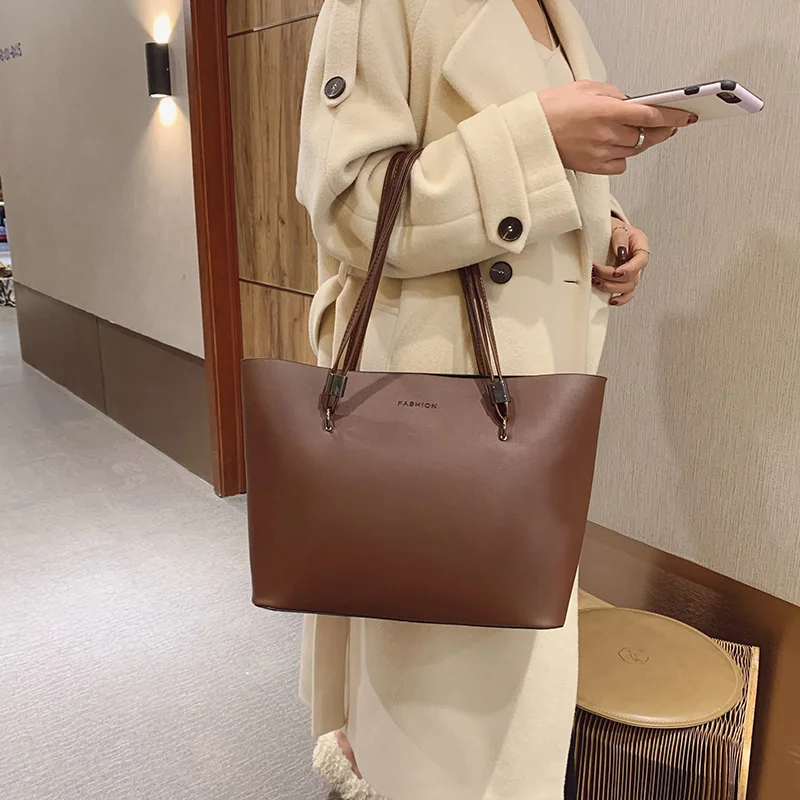
Frequently Asked Questions
Is all vegan leather environmentally friendly?
No, not all vegan leather offers the same environmental benefits. Plant-based options like pineapple or cactus leather generally have lower environmental impacts than petroleum-based synthetic options like PVC. When environmental impact is your primary concern, look specifically for bio-based materials or recycled content.
How durable is vegan leather compared to real leather?
Quality varies significantly. Premium vegan leathers can last for many years with proper care, though traditional leather often develops a distinctive patina with age that synthetics don’t replicate. High-quality plant-based vegan leathers have shown impressive durability, while lower-quality synthetic options may crack or peel within a few years.
Does vegan leather look and feel like real leather?
Modern vegan leathers can look remarkably similar to animal leather, with advanced manufacturing creating convincing textures and finishes. The feel can vary—some premium options like mushroom leather capture the distinctive supple quality of animal leather, while others have their own unique characteristics.
What are the most sustainable types of vegan leather?
Currently, organic and plant-based options derived from agricultural waste (like grape leather, pineapple leather, or apple leather) typically offer the best sustainability profile. Materials that biodegrade at end-of-life and require minimal additional resources to produce generally create the smallest environmental footprint.
How can I identify high-quality vegan leather?
Look for detailed material specifications rather than vague “vegan leather” labeling, consistent texture and finish throughout the product, quality construction details like reinforced stitching and solid hardware, and transparent information from the manufacturer about the specific materials used. The comparing traditional briefcase qualities to vegan alternatives can help you identify key indicators of quality.
Why Vegan Leather is Worth Considering: Making an Informed Decision
Choosing vegan leather represents more than just a product selection—it’s a statement about your values and priorities. By selecting high-quality vegan leather accessories, you can enjoy professional, sophisticated style while aligning with ethical principles and often reducing environmental impact (particularly with plant-based options).
The rapid advancement in vegan leather quality and variety means you no longer need to compromise on appearance, functionality, or durability. Today’s premium vegan leather options deliver exceptional performance while offering practical benefits like easier maintenance and often more accessible price points.
As you consider your next professional accessory purchase, remember that these choices collectively drive market innovation. Each selection of a thoughtfully produced vegan leather product encourages further development of sustainable, ethical alternatives that perform even better.
For professional settings where appearance matters, today’s sophisticated vegan leather options offer the perfect balance—maintaining a polished image while making a forward-thinking choice. Explore our collection of vegan leather work totes, vegan leather briefcases, and vegan leather messenger bags to discover professional accessories that complement both your career needs and personal values. We also offer additional options including faux leather work totes and various non-leather professional bag options to suit different preferences and requirements.

